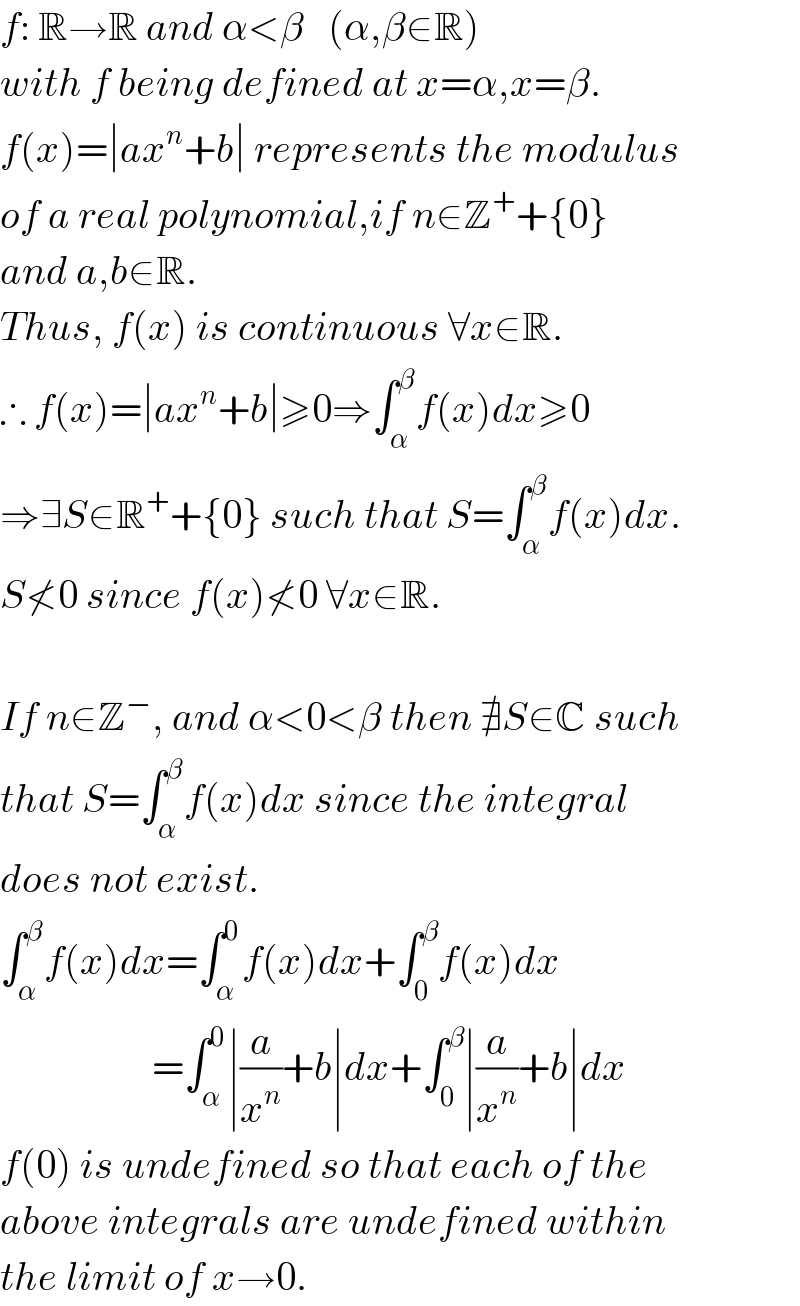
Question Number 4116 by Filup last updated on 29/Dec/15

$$\mathrm{For}:\:{f}\left({x}\right)=\mid{ax}^{{n}} +{b}\mid \\ $$ $$\mathrm{when}\:{f}\left(\alpha\right)\:\mathrm{o}\:{f}\left(\beta\right)\:\mathrm{is}\:\mathrm{continuous}, \\ $$ $$\mathrm{Does}\:\mathrm{there}\:\mathrm{exist}\:\mathrm{a}\:\mathrm{solution}: \\ $$ $${S}=\int_{\alpha} ^{\:\beta} {f}\left({x}\right){dx} \\ $$ $$\alpha<\beta \\ $$
Commented byYozzii last updated on 29/Dec/15

$${f}:\:\mathbb{R}\rightarrow\mathbb{R}\:{and}\:\alpha<\beta\:\:\:\left(\alpha,\beta\in\mathbb{R}\right) \\ $$ $${with}\:{f}\:{being}\:{defined}\:{at}\:{x}=\alpha,{x}=\beta. \\ $$ $${f}\left({x}\right)=\mid{ax}^{{n}} +{b}\mid\:{represents}\:{the}\:{modulus} \\ $$ $${of}\:{a}\:{real}\:{polynomial},{if}\:{n}\in\mathbb{Z}^{+} +\left\{\mathrm{0}\right\} \\ $$ $${and}\:{a},{b}\in\mathbb{R}. \\ $$ $${Thus},\:{f}\left({x}\right)\:{is}\:{continuous}\:\forall{x}\in\mathbb{R}. \\ $$ $$\therefore\:{f}\left({x}\right)=\mid{ax}^{{n}} +{b}\mid\geqslant\mathrm{0}\Rightarrow\int_{\alpha} ^{\beta} {f}\left({x}\right){dx}\geqslant\mathrm{0} \\ $$ $$\Rightarrow\exists{S}\in\mathbb{R}^{+} +\left\{\mathrm{0}\right\}\:{such}\:{that}\:{S}=\int_{\alpha} ^{\beta} {f}\left({x}\right){dx}. \\ $$ $${S}\nless\mathrm{0}\:{since}\:{f}\left({x}\right)\nless\mathrm{0}\:\forall{x}\in\mathbb{R}. \\ $$ $$ \\ $$ $${If}\:{n}\in\mathbb{Z}^{−} ,\:{and}\:\alpha<\mathrm{0}<\beta\:{then}\:\nexists{S}\in\mathbb{C}\:{such} \\ $$ $${that}\:{S}=\int_{\alpha} ^{\beta} {f}\left({x}\right){dx}\:{since}\:{the}\:{integral} \\ $$ $${does}\:{not}\:{exist}.\: \\ $$ $$\int_{\alpha} ^{\beta} {f}\left({x}\right){dx}=\int_{\alpha} ^{\mathrm{0}} {f}\left({x}\right){dx}+\int_{\mathrm{0}} ^{\beta} {f}\left({x}\right){dx} \\ $$ $$\:\:\:\:\:\:\:\:\:\:\:\:\:\:\:\:\:\:\:=\int_{\alpha} ^{\mathrm{0}} \mid\frac{{a}}{{x}^{{n}} }+{b}\mid{dx}+\int_{\mathrm{0}} ^{\beta} \mid\frac{{a}}{{x}^{{n}} }+{b}\mid{dx} \\ $$ $${f}\left(\mathrm{0}\right)\:{is}\:{undefined}\:{so}\:{that}\:{each}\:{of}\:{the} \\ $$ $${above}\:{integrals}\:{are}\:{undefined}\:{within} \\ $$ $${the}\:{limit}\:{of}\:{x}\rightarrow\mathrm{0}. \\ $$
